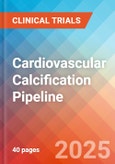Cardiovascular Calcification Understanding
Cardiovascular Calcification: Overview
Cardiovascular calcification is a process in which mineral deposits formed in vessel walls and heart valve leaflets and can lead to tissue stiffening, plaque rupture and heart failure. Several biological processes contribute to cardiovascular calcification, including extracellular vesicle release, matrix remodelling, loss of mineral-deposition inhibition, impaired mineral resorption, oxidative stress, mitochondrial dysfunction, inflammation and stem and progenitor cell programmes. It is a commonly observed but incompletely understood mechanism of increased atherosclerotic plaque instability and accelerated aortic valve stenosis.Diagnosis
A diagnosis of Cardiovascular Calcification is made based upon a thorough clinical evaluation and a variety of specialized tests. Imaging tests, like CT, Intravascular ultrasound are used to quantify. Current methods for cardiovascular calcification imaging are mostly limited to advanced calcification and miss clinically relevant early microcalcifications. Implementation of advanced imaging tools and artificial intelligence might improve diagnostics and risk assessment. Optical coherence tomography (OCT) also has high sensitivity and specificity to identify Coronary artery calcification.Treatment
The goal in treating coronary calcification is to slow (and possibly reverse) its progression and prevent serious consequences such as heart attack or stroke. Controlling risk factors can help limit coronary calcification and prevent life-threatening disease. Treating Cardiovascular Calcification involves invasive surgeries and costly transcatheter procedures. Medicines like PCSK 9 inhibitors (eg, Repatha, Praluent) can help in lowering the cholesterol, ACE inhibitors, and diuretics can be taken to reduce blood pressure. New therapies are under clinical development, promising advanced treatment.Cardiovascular Calcification Emerging Drugs Chapters
This segment of the Cardiovascular Calcification report encloses its detailed analysis of various drugs in different stages of clinical development, including phase II, I, preclinical and Discovery. It also helps to understand clinical trial details, expressive pharmacological action, agreements and collaborations, and the latest news and press releases.Cardiovascular Calcification Emerging Drugs
SNF 472: Sanifit
SNF472 is a novel small molecule, and a selective and potent inhibitor of hydroxyapatite (HAP) crystallization, the final common pathway that leads to vascular calcification. Sanifit’s SNF 472 blocks calcification, with action independent of Ca/Phosphate levels.The therapy is in Phase 2b trial (CaLIPSO) to assess the effect of SNF472 on slowing arterial calcification, a major risk factor for cardiovascular diseases in patients on dialysis.
INS-3001: Inositec
INS-3001 is a cardiovascular calcification inhibitor, based on myo-inositol hexaphosphate (IP6). It is being developed to treat a number of diseases driven by cardiovascular calcification, including aortic valve stenosis. The molecule has demonstrated the ability to significantly inhibit the calcification process in preclinical studies.Cardiovascular Calcification: Therapeutic Assessment
This segment of the report provides insights about the different Cardiovascular Calcification drugs segregated based on following parameters that define the scope of the report, such as:Major Players in Cardiovascular Calcification
There are approx. 6+ key companies which are developing the therapies for Cardiovascular Calcification. The companies which have their Cardiovascular Calcification drug candidates in the most advanced stage, i.e. phase II include, Sanifit.Phases
The report covers around 6+ products under different phases of clinical development like
- Late stage products (Phase III)
- Mid-stage products (Phase II)
- Early-stage product (Phase I) along with the details of
- Pre-clinical and Discovery stage candidates
- Discontinued & Inactive candidates
Route of Administration
Cardiovascular Calcification pipeline report provides the therapeutic assessment of the pipeline drugs by the Route of Administration. Products have been categorized under various ROAs such as- Oral
- Parenteral
- intravitreal
- Subretinal
- Topical.
Molecule Type
Products have been categorized under various Molecule types such as
- Monoclonal Antibody
- Peptides
- Polymer
- Small molecule
- Gene therapy
Product Type
Drugs have been categorized under various product types like Mono, Combination and Mono/Combination.Cardiovascular Calcification: Pipeline Development Activities
The report provides insights into different therapeutic candidates in phase II, I, preclinical and discovery stage. It also analyses Cardiovascular Calcification therapeutic drugs key players involved in developing key drugs.Pipeline Development Activities
The report covers the detailed information of collaborations, acquisition and merger, licensing along with a thorough therapeutic assessment of emerging Cardiovascular Calcification drugs.Report Highlights
The companies and academics are working to assess challenges and seek opportunities that could influence Cardiovascular Calcification R&D. The therapies under development are focused on novel approaches to treat/improve Cardiovascular Calcification.Cardiovascular Calcification Report Insights
- Cardiovascular Calcification Pipeline Analysis
- Therapeutic Assessment
- Unmet Needs
- Impact of Drugs
Cardiovascular Calcification Report Assessment
- Pipeline Product Profiles
- Therapeutic Assessment
- Pipeline Assessment
- Inactive drugs assessment
- Unmet Needs
Key Questions
Current Treatment Scenario and Emerging Therapies:
- How many companies are developing Cardiovascular Calcification drugs?
- How many Cardiovascular Calcification drugs are developed by each company?
- How many emerging drugs are in mid-stage, and late-stage of development for the treatment of Cardiovascular Calcification?
- What are the key collaborations (Industry-Industry, Industry-Academia), Mergers and acquisitions, licensing activities related to the Cardiovascular Calcification therapeutics?
- What are the recent trends, drug types and novel technologies developed to overcome the limitation of existing therapies?
- What are the clinical studies going on for Cardiovascular Calcification and their status?
- What are the key designations that have been granted to the emerging drugs?
Key Players
- Sanifit
- Inositec
- Sanofi
- Dong-A ST
Key Products
- SNF 472
- INS-3001
- HMR1766
- Evogliptin
This product will be delivered within 2 business days.
Table of Contents
Companies Mentioned (Partial List)
A selection of companies mentioned in this report includes, but is not limited to:
- Sanifit
- Inositec
- Sanofi
- Dong-A ST








